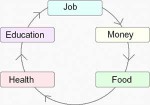 What are the verbs of Systemic Change? Father Robert Maloney, C.M., former Superior General writes:
What are the verbs of Systemic Change? Father Robert Maloney, C.M., former Superior General writes:
Systematize, institutionalize and evaluate the project and its procedures, describing measurable indicators and results.
 In this strategy, all three verbs are important:
In this strategy, all three verbs are important:
 First, systematize. Focus not just on the individual aspects of the problem, but on the system as a whole, with its many aspects. Try to see how the “pieces of life” fit together. Having a job produces wages. Wages enable the purchase of food and decent housing. Good nourishment and sanitary living conditions foster health and education. Health and education are related to getting a job that produces wages. And so on.
First, systematize. Focus not just on the individual aspects of the problem, but on the system as a whole, with its many aspects. Try to see how the “pieces of life” fit together. Having a job produces wages. Wages enable the purchase of food and decent housing. Good nourishment and sanitary living conditions foster health and education. Health and education are related to getting a job that produces wages. And so on.
One of the keys to systemic change is to discern where to attempt to break into the cycle of poverty, so that the project being envisioned will treat not just one problem, providing a short-term solution, but will confront various problems step by step.
Second, institutionalize. Like buildings, projects last only if they are well-structured. If a project is to be sustainable, it must be “institutionalized”; that is, structures must be created for planning, governing, financing, modifying and continuing the project as time goes on. A striking example of a well-institutionalized, yet relatively simple, project can be found at www.kiva.org
This website has brought micro-lending into the homes of people everywhere in the world, offering them the opportunity to make loans. It aims at systemic change in the lives of the beneficiaries. The site introduces them to the potential lender and defines their projects clearly. The proposed loans are small ($25, $50, etc.), but attractively packaged. After someone makes a loan, the site gives a running account of how it is repaid and offers many clever ways for lenders to attract new lenders and to encourage the involvement of friends and others.
Third, evaluate. Evaluation is an indispensable follow-up to action. A periodic review of a project provides the opportunity to assess its positive and negative aspects and, as problems arise or circumstances change, to adjust its goals, methods and means.
Several Web sites can help with formulating evaluations. A good one to try is Introduction to Evaluation at the Web Center for Social Research Methods.
Other sites can help with carrying out evaluations and compiling their results. One which is widely used is SurveyMonkey.com
Because of his love for the poor, St. Vincent was very concerned about the results of the projects he was engaged in, so he asked experts to give their opinion about how things were going. Among his legal documents we find the following:
To this end, the sites will be seen and visited, and the aforementioned improvements inspected and appraised by experts upon whom the parties will agree before Monsieur Gontier, the arbitrator. The experts will make a report on the sites.
(SV II, Appendix 2. Petition of St. Vincent to the Parliament)
For the original source, click here.







0 Comments